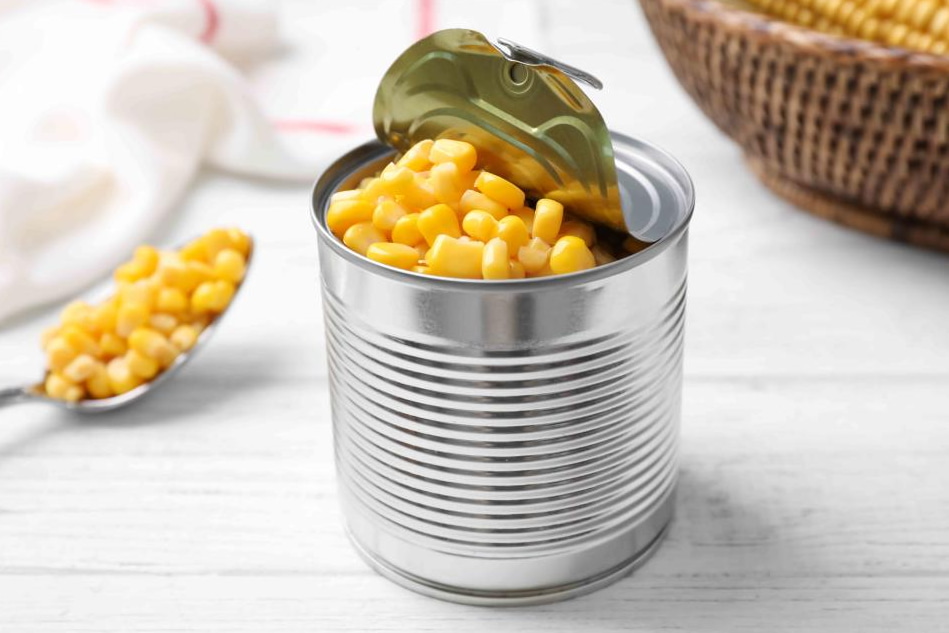Canned corn is a popular food found in many kitchens. It’s sweet, easy to use, and can be added to various meals. But what makes canned corn good for you? Let’s explore its benefits and some things to watch out for.
Table of Contents
What Is Canned Corn?
Canned corn is sweet corn that’s cooked and sealed in a can. This process keeps it fresh and ready to eat anytime. You can find it in most grocery stores, and it’s a quick way to add vegetables to your meals.
Nutritional Benefits of Canned Corn
Canned corn isn’t just tasty; it’s also packed with nutrients that help your body stay healthy.
1. Provides Energy
Can corn contains carbohydrates, which are the body’s main source of energy. Eating corn can help you feel energetic throughout the day.
2. Supports Digestion
Corn is high in dietary fiber. Fiber helps keep your digestive system running smoothly and can prevent constipation.
3. Rich in Vitamins and Minerals
Canned corn offers essential vitamins like B vitamins, which help your body use energy from food. It also contains minerals like magnesium and potassium that support various body functions.
4. Good for Eye Health
Corn contains antioxidants like lutein and zeaxanthin, which are known to support eye health and may reduce the risk of certain eye conditions.
Things to Consider When Eating Canned Corn
While canned corn has many benefits, there are a few things to keep in mind.
1. Sodium Content
Some can corn products have added salt to preserve flavor. Eating too much sodium can lead to high blood pressure. Look for low-sodium options or rinse the corn before eating to reduce salt content.
2. Portion Control
Even healthy foods should be eaten in moderation. Eating large amounts of corn can lead to excessive calorie intake. Stick to recommended serving sizes to maintain a balanced diet.
How to Enjoy Canned Corn
Canned corn is versatile and can be used in many dishes:
- Salads: Add corn to your favorite salad for a sweet crunch.
- Soups and Stews: Mix corn into soups for added texture and flavor.
- Side Dishes: Serve corn as a side with a bit of butter and herbs.
- Tacos and Wraps: Include corn in tacos for extra taste.
Choosing the Best Can Corn
When shopping for can corn, consider these tips:
- Check the Label: Look for corn with no added sugars or preservatives.
- Low-Sodium Options: Choose cans labeled “low sodium” to reduce salt intake.
- BPA-Free Cans: Some cans are lined with BPA, a chemical that may have health risks. Opt for BPA-free cans when possible.
Conclusion
Canned corn is a convenient and nutritious food that can be a great addition to your meals. It provides energy, supports digestion, and offers essential vitamins and minerals.
By choosing the right products and enjoying corn in moderation, you can make the most of its health benefits. For more information visit Remedyu.com.
FAQs About Canned Corn
1. Is canned corn healthy?
Yes, canned corn is healthy when eaten in moderation. It provides energy, fiber, and important vitamins like B vitamins and antioxidants such as lutein and zeaxanthin.
2. Does canned corn have preservatives?
Some canned corn may contain added salt or preservatives. Always check the label for ingredients. You can rinse canned corn before use to remove extra salt.
3. Can I eat canned corn every day?
You can eat canned corn regularly, but it’s best to enjoy it as part of a balanced diet. Too much of any one food can lead to an unbalanced intake of nutrients.
4. Is canned corn as nutritious as fresh corn?
Canned corn retains most of its nutrients during processing, though some vitamin loss may occur. It’s still a good source of fiber, carbs, and antioxidants.
5. Should I rinse corn before eating?
Yes, rinsing canned corn can reduce sodium levels and remove any added preservatives, making it a healthier choice.
6. Is it safe for kids?
Absolutely. Canned corn is soft, mildly sweet, and easy to digest, making it a kid-friendly food. Just ensure it’s low in sodium and served in proper portions.
7. Does canned corn cause weight gain?
Corn is not fattening on its own. However, if consumed in large amounts or with high-calorie toppings like butter and cheese, it could contribute to weight gain.
8. Can people with diabetes eat canned corn?
Yes, but they should watch portion sizes. Corn has natural sugars and carbs, so diabetics should consult with a doctor or dietitian for proper intake.
